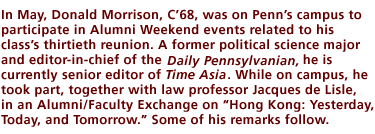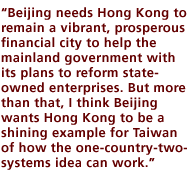A Pretty Positive Picture

Don Morrison speculates that Hong Kong is a place about which more novels have been written than any other city in the world. "The quintessential Hong Kong novel," he observed, "is composed of equal parts high stakes international intrigue, a furious scramble for money in this no-holds-barred temple of laissez-faire capitalism, and a little touch of the exotic with colorful coolies walking around and sloe-eyed Chinese beauties dressed in those wonderful cheong-sams--all overlaid with a veneer of British civility." Morrison also noted that Noel Coward wrote some lyrics about Hong Kong's colonial overlords, the "mad dog Englishmen," informing the world of the curious custom of firing the noon-day gun in Causeway Bay. Local legend traces the more than one hundred year-old tradition back to an incident involving one of Jardine Matheson and Company's opium boats sailing into the harbor.
When Morrison arrived in Hong Kong about four years ago, there was, he recounted, an increasingly grim sense that the day of the Hong Kong novel was about to end. As a result of the legal and diplomatic wrangling over the impending handover of Hong Kong to China, many believed "this bastion of cosmopolitan, free-wheeling capitalism just might not survive."
Many of the points in Morrison's assessment of Hong Kong's recent history and his views of the future correspond to Ray Ch'ien's outlook. "One year after the handover," Morrison reports, "much of the tension that hung over the city has disappeared. We think word has gone out from the highest levels in Beijing that the Chinese establishment is to keep hands off Hong Kong." Concerns about mainland-style corruption and about freedom itself have dissipated as it has become increasingly clear that China's overriding priority is to let Hong Kong thrive. The newspapers are just as feisty, and Hong Kong's "polite and well behaved" demonstrators hound Chief Executive Tung Chee Hwa wherever he goes. "So the picture is--I wouldn't even say it's mixed; I'd say it's pretty positive."
Morrison's optimism about the future derives from the conviction that, as China plunges full tilt into a Western-style market economy with its attendant openness and prosperity, the interests of Hong Kong and Beijing will converge. "Beijing needs Hong Kong to remain a vibrant, prosperous financial city to help the mainland government with its plans to reform state-owned enterprises. But more than that, I think Beijing wants Hong Kong to be a shining example for Taiwan of how the one-country-two-systems idea can work."
 Hong Kong's most serious problems, Morrison believes, derive in large part from the new administration, "which simply isn't equipped to govern. It's been a year of bumbling and indecision." The most serious threat facing the city is a public health crisis. "This beautiful, shimmering jewel on the sea is in fact a cesspool, an environmental and health ticking time bomb--an exploding time bomb. In the past few months we've had chicken flu, a cholera epidemic, and scandals over tainted pork products and about every food product you can name. A red tide closed down the beautiful white-sand beach right across from my apartment."
Hong Kong's most serious problems, Morrison believes, derive in large part from the new administration, "which simply isn't equipped to govern. It's been a year of bumbling and indecision." The most serious threat facing the city is a public health crisis. "This beautiful, shimmering jewel on the sea is in fact a cesspool, an environmental and health ticking time bomb--an exploding time bomb. In the past few months we've had chicken flu, a cholera epidemic, and scandals over tainted pork products and about every food product you can name. A red tide closed down the beautiful white-sand beach right across from my apartment."
"But Hong Kong still looks like a million bucks," Morrison concluded. "It's terrific. The high-rises are still rising high, creating one of the world's most beautiful skylines. The white sand beach that I can see from my balcony still looks pretty good, even though there's a huge pipe beside it that gives off this amazing brown stuff. But there's a long-term plan to fix that up. I think it will probably be OK. I don't know whether people will still write interesting novels about Hong Kong, but I do know that they still fire the noon-day gun everyday. It's not because the government has decided this is a tradition that should be kept but because, in Hong Kong's own inimitable way of allowing the private sector to do just about everything, the gun is and has always been operated by the Jardines."